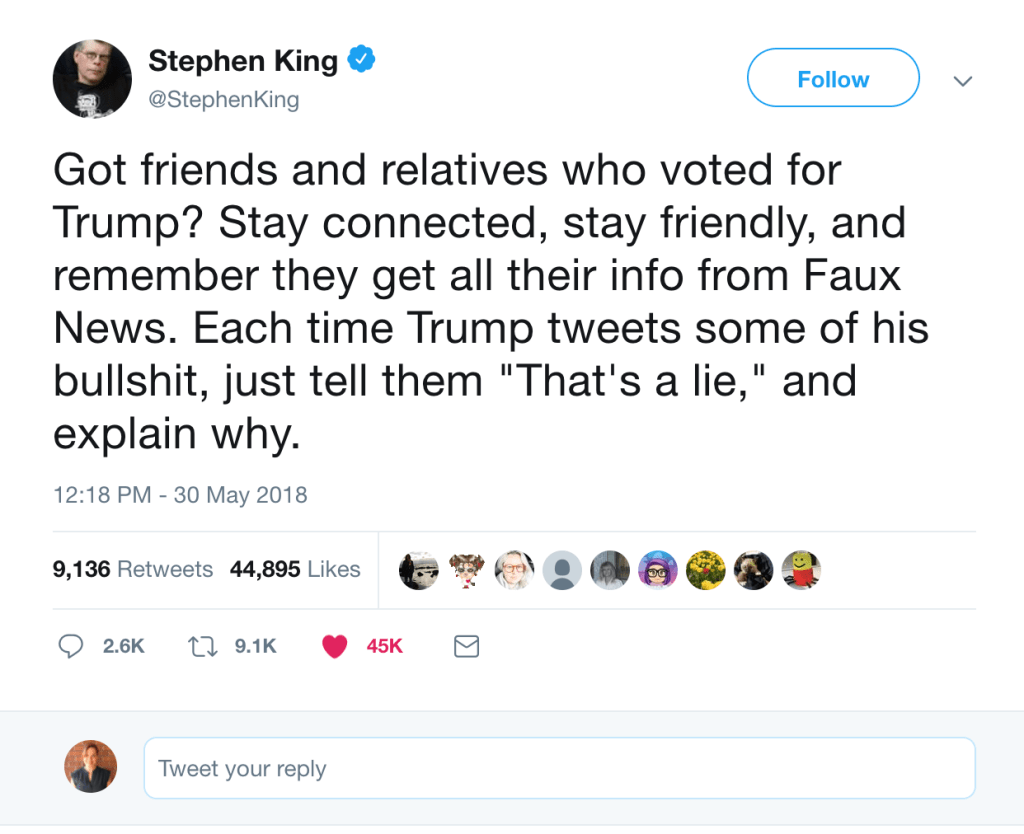One of the hard questions many of us have been asking ourselves: “Should I stay friends with Trump supporters?” My gut says save yourself the heartache, but nonviolent action theory says YES – and so does Stephen King.

King has also called Trump a “nut job” and wrote that the president’s access to the nuclear codes “worse than any horror story I ever wrote.” So there’s that.
I asked friends on Facebook to tell me about a conversation they had with a 45-loving family member or friend that went WELL, and here’s what I got:
- It would be an imaginary tale.
- I think all of my in-laws voted for him. It’s put a strain on our relationship
- Oh I’ve unfriended both friends and family members over this floridfacedfatfuck
- My brother 🙄. We don’t talk about it. My mom is just anti-democrat but falls short of Trump-loving. I will way that she is appalled, surprised, and receptive when I show her news not available on Fox
- I WOULD have a conversation, but have to spit whenever that name is mentioned. It always seems to go back to what Obama did or didn’t do.
- every time i’ve tried it’s just turned into a never ending tire fire.
- When can I stop laughing? They’re all gone.
I’m fessing up. I’m writing about the importance of building bridges, but I fully admit that I screen all of my contacts on social media for any whiff of Trump. I know that my uncle has called Trump “the best president of my lifetime,” and I admit that I don’t mind so much that I haven’t seen him since the election. It’s not like these conversations are out of my comfort zone – I’m a liberal lesbian Democrat and I managed to work with the Bush administration – but this is something different.
So here’s a gut check: the research shows that keeping the communication lines open is vital component of successful nonviolent resistance. Gene Sharp’s research showed that an effective alternative to boycotting soldiers and police is to:
- befriend them and convince them that hostility is not part of the resistance;
- convince them that the objects of the regime are immoral and unjust;
- to convince the opposition to resist or refuse to carry out orders;
- to convince the opposition to provide information to the resistance about the oppressor’s plans.
In 1915, Gandhi demonstrated that “befriending one’s enemy” worked to change opinions about the untouchables in India. In the Hungarian Revolution in 1956, revolutionaries made deliberate efforts to befriend Russian soldiers, and “something like a bond of sympathy” arose, leading soldiers to align with Hungarians.
In March 2011, Syrian activist Islam al-Dabbas, known locally as “The Flower Guy,” led his fellow protesters in bringing water and flowers to the army and security forces that were trying to end demonstrations. He’s now serving 15 years in prison. “We wanted to send a message: these protests are peaceful,” said his brother Mohamed. “My father and brother did nothing more than peacefully ask for justice and freedom.”
Can a democracy survive the kind of polarization we’re experiencing? I’ll be writing about that in future posts. In the meantime, if you’ve managed to keep a friendly relationship with Trump-supporting family and friends, hit me up in the comments.

